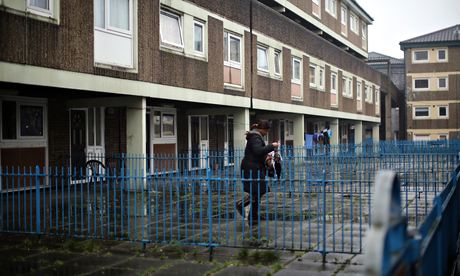The general secretary of Unite says Thomas Piketty's book gives an intellectual edge to his own view that something is wrong with our economic system, and proves that radical change is needed

The Falinge estate in Rochdale, one of the most deprived areas in England … an Oxfam report found that the five richest families in the UK have more wealth than the poorest 12m. Photograph: Christopher Furlong/Getty Images
Like everyone else, I'm fascinated that Thomas Piketty's book Capital in the Twenty-First Century is having such an impact.
Piketty shows that because the return on capital outstrips growth, and is likely to continue to do so, inequality grows bigger and bigger. The only way that this can be remedied is with intervention from governments, otherwise we'll all pay the price for it. Currently his book is the No 1 bestseller on Amazon in the US, and No 5 on the UK list. It's what he must have dreamed about when he put it all together.
I was alerted to the book a couple of months ago by my friend Tom Watson. Soon afterwards I was talking to another friend who'd finished it already. He's not a socialist, just an ordinary liberal American, and he thought it was a revelation.
The excitement reminds me a bit of when The Spirit Level came out in 2009, and everyone said what a fabulous piece of work it was. I read it and a part of me was thinking: "Hang on, this is just telling us what we already know! Inequality is bad for everybody." But of course, placing it in the context of evidence is helpful. As that book did, Piketty solidifies and gives an intellectual edge to the view that something is wrong here, and something new and bold and radical has got to be done.
And this is manna from heaven for somebody like me, not for any devilish reasons, but because I have been saying for a while that we need to look at things completely differently. People must not just accept that this is the normal cycle that we're going through. These are extraordinary times. Last month, an Oxfam report found that the five richest families in the UK have more wealth than the poorest 12m. That requires extraordinary actions.
Piketty talks about the importance of international taxation, which raises real questions about practicality. Obviously for me the role of strong trade unions is critical, because this is all about the redistribution of wealth, and a way to get a greater share of our GDP going to wages, which in turn stimulates sustainable growth.
I think any reasonable person would say that if the gap between the super-rich and the rest of us continues to grow, it can only bring social unrest. This could manifest itself in a variety of ways, none of them good. You can even take that further and talk about the prospect of war. When you look at the situation in Ukraine at the moment, it was brought about to a large extent because of the failures in Russia and Ukraine, where there has been a hugely widening gap between rich and poor. Currently we're in a situation where our own government is opposing the Tobin tax that France and even Germany are trying to push for.
Whether global intervention is feasible is something we have to look at and debate. I suspect Ed Miliband will be looking closely at this book as he tries to knit together his alternative to George Osborne's austerity programme. People like me, and others, are certainly excited by the prospect of where Piketty might take us.


No comments:
Post a Comment